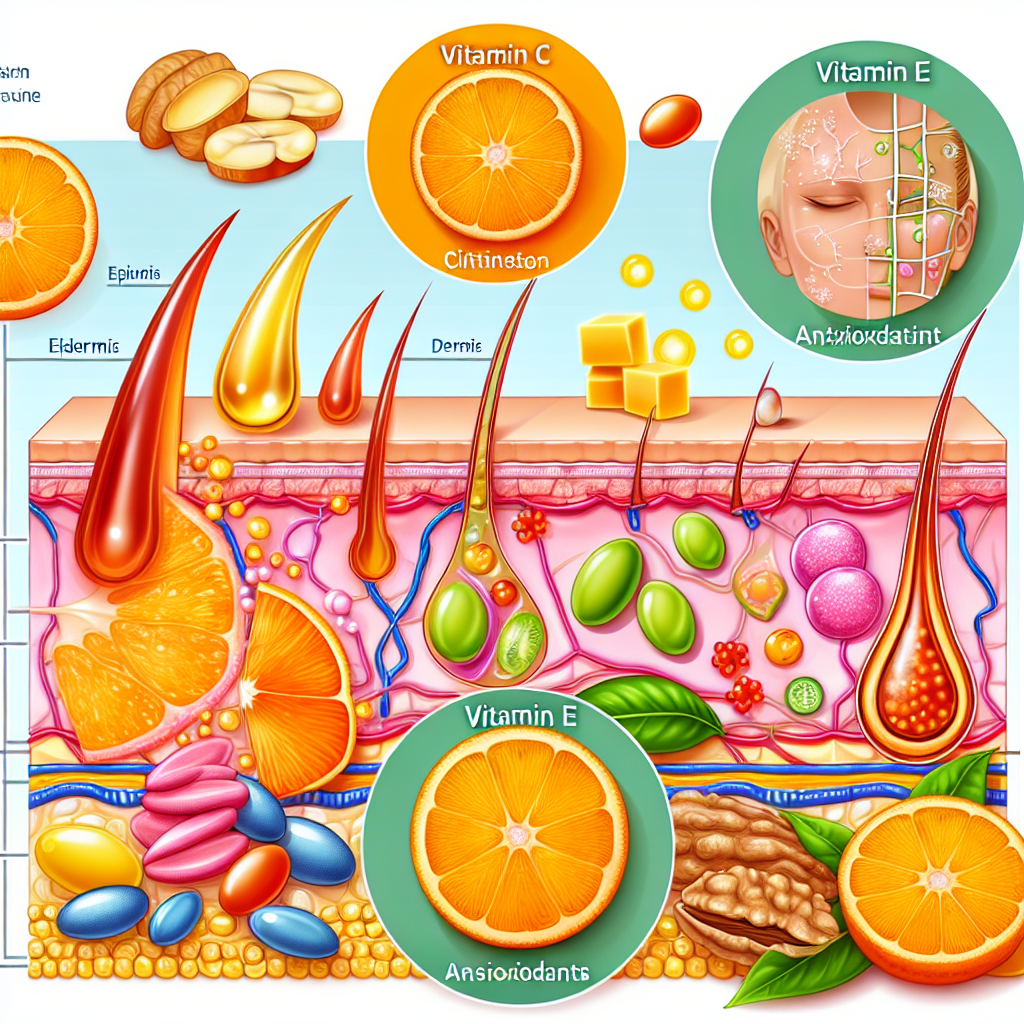How Vitamin C and E Keep Your Skin Glowing

Discover the secret to glowing skin with Vitamins C and E! Learn how these essential nutrients can enhance your skin’s health and give you that radiant glow you’ve always wanted. Don’t wait, start your journey to vibrant skin today. Click here to find out more.
The Role of Vitamin C and E in Achieving Radiant Skin
The quest for radiant, glowing skin is a journey that many embark on, but few truly understand the science behind achieving this coveted glow. The secret to radiant skin lies not only in the products we apply topically but also in the nutrients we consume. Among these nutrients, two vitamins stand out for their remarkable benefits to the skin: Vitamin C and Vitamin E.
Vitamin C, also known as ascorbic acid, is a water-soluble vitamin that plays a crucial role in maintaining skin health. It is a potent antioxidant that neutralizes harmful free radicals, unstable molecules that can damage the skin cells. By doing so, Vitamin C helps to prevent premature aging and maintain the skin’s youthful appearance.
Moreover, Vitamin C is essential for the synthesis of collagen, a protein that provides structure and elasticity to the skin. As we age, our bodies produce less collagen, leading to wrinkles and sagging skin. By boosting collagen production, Vitamin C helps to keep the skin firm and smooth, contributing to a youthful, radiant complexion.
Additionally, Vitamin C has been shown to inhibit the production of melanin, the pigment responsible for skin color. This property makes Vitamin C a powerful ally in the fight against hyperpigmentation and dark spots, helping to even out skin tone and enhance the skin’s natural glow.
On the other hand, Vitamin E, a fat-soluble vitamin, also plays a significant role in skin health. Like Vitamin C, Vitamin E is a powerful antioxidant that helps protect the skin from damage caused by free radicals. However, Vitamin E’s antioxidant properties are particularly effective in protecting the skin from damage caused by exposure to ultraviolet (UV) radiation from the sun.
UV radiation is one of the leading causes of premature skin aging and skin cancer. By neutralizing the harmful effects of UV radiation, Vitamin E helps to prevent these conditions, contributing to healthier, more radiant skin.
Furthermore, Vitamin E has been shown to have anti-inflammatory properties. Inflammation is a common skin condition that can lead to redness, swelling, and discomfort. By reducing inflammation, Vitamin E helps to soothe the skin, promoting a smoother, more even complexion.
Interestingly, Vitamin C and E work synergistically to enhance each other’s benefits. Vitamin C helps to regenerate Vitamin E, enhancing its antioxidant properties. In turn, Vitamin E helps to stabilize Vitamin C, increasing its effectiveness. This synergistic relationship makes these two vitamins a powerful duo in the pursuit of radiant skin.
In conclusion, Vitamin C and E play a crucial role in achieving radiant, glowing skin. They protect the skin from damage, boost collagen production, fight hyperpigmentation, and soothe inflammation. Moreover, they enhance each other’s effectiveness, making them a potent combination for skin health. Therefore, incorporating these vitamins into your skincare routine and diet can significantly contribute to achieving the coveted glow. However, it’s important to remember that while these vitamins are beneficial, they are not a substitute for a balanced diet, adequate hydration, and protection from the sun. Achieving radiant skin is a holistic process that requires a comprehensive approach to skincare and overall health.
Unlocking the Secrets of Glowing Skin: The Power of Vitamins C and E

Unlocking the secrets of glowing skin is a quest that has been pursued by many for centuries. In the modern era, the pursuit of a radiant complexion has led to the discovery of the powerful role that vitamins play in skin health. Among these, vitamins C and E have emerged as potent allies in maintaining and enhancing the skin’s natural glow.
Vitamin C, also known as ascorbic acid, is a water-soluble vitamin that is essential for the synthesis of collagen, a protein that provides structure and elasticity to the skin. As we age, the production of collagen in our bodies decreases, leading to the formation of wrinkles and sagging skin. By boosting collagen production, vitamin C helps to maintain the skin’s firmness and elasticity, thereby contributing to a youthful and radiant appearance.
Moreover, vitamin C is a potent antioxidant that protects the skin from damage caused by free radicals, unstable molecules that can damage cells and contribute to aging and diseases. Exposure to environmental factors such as pollution and ultraviolet (UV) radiation from the sun increases the production of free radicals in the skin. By neutralizing these harmful molecules, vitamin C helps to prevent the signs of premature aging such as wrinkles, fine lines, and dark spots.
In addition to its antioxidant properties, vitamin C also inhibits the production of melanin, the pigment that gives skin its color. Overproduction of melanin can lead to the formation of dark spots and uneven skin tone. By reducing melanin production, vitamin C helps to brighten the skin and improve its overall complexion.
Like vitamin C, vitamin E is also a powerful antioxidant that protects the skin from damage caused by free radicals. However, unlike vitamin C, which is water-soluble, vitamin E is a fat-soluble vitamin that is stored in the body’s fat tissues. This allows vitamin E to provide long-lasting protection against free radicals, making it an essential nutrient for maintaining healthy skin.
Vitamin E also has anti-inflammatory properties that help to soothe and calm the skin. Inflammation is a common response to skin damage and can lead to redness, swelling, and discomfort. By reducing inflammation, vitamin E helps to maintain the skin’s natural balance and promote a healthy glow.
Furthermore, vitamin E supports the skin’s natural healing process. When the skin is damaged, whether by a cut, burn, or sunburn, vitamin E helps to speed up the healing process and reduce the appearance of scars. This makes vitamin E an important nutrient for maintaining the skin’s overall health and appearance.
In conclusion, vitamins C and E play a crucial role in maintaining and enhancing the skin’s natural glow. By boosting collagen production, protecting the skin from damage caused by free radicals, reducing inflammation, and supporting the skin’s natural healing process, these vitamins help to keep the skin healthy, youthful, and radiant. Therefore, incorporating these vitamins into your skincare routine can be a powerful strategy for unlocking the secrets of glowing skin.
How Vitamins C and E Contribute to a Healthy, Glowing Complexion
Vitamin C and E are two essential nutrients that play a significant role in maintaining a healthy, glowing complexion. These vitamins are potent antioxidants that protect the skin from harmful free radicals, promote collagen production, and aid in skin repair and regeneration.
Vitamin C, also known as ascorbic acid, is a water-soluble vitamin that is crucial for skin health. It is a powerful antioxidant that neutralizes harmful free radicals, unstable molecules that can damage the skin cells and accelerate the aging process. By neutralizing these free radicals, vitamin C helps to prevent premature skin aging, reduce wrinkles, and improve skin texture.
Moreover, vitamin C plays a vital role in collagen synthesis, a protein that provides structure and elasticity to the skin. As we age, our skin’s collagen production decreases, leading to sagging skin and the formation of wrinkles. By promoting collagen production, vitamin C helps to maintain the skin’s firmness and elasticity, resulting in a youthful, glowing complexion.
In addition to its antioxidant properties and role in collagen synthesis, vitamin C also has skin brightening effects. It inhibits the enzyme tyrosinase, which is responsible for melanin production. Melanin is the pigment that gives color to our skin, hair, and eyes. By inhibiting melanin production, vitamin C can help to lighten hyperpigmentation and dark spots, even out skin tone, and enhance skin radiance.
On the other hand, vitamin E, also known as tocopherol, is a fat-soluble vitamin that is also essential for skin health. Like vitamin C, vitamin E is a powerful antioxidant that protects the skin from harmful free radicals. However, vitamin E’s antioxidant properties are particularly effective in protecting the skin from UV damage. By absorbing the harmful UV rays before they can damage the skin cells, vitamin E helps to prevent sunburn, reduce the risk of skin cancer, and prevent premature skin aging.
Furthermore, vitamin E has anti-inflammatory properties that can help to soothe and calm irritated skin. It also aids in skin repair and regeneration by strengthening the skin barrier function, improving moisture retention, and accelerating the healing process of wounds and scars.
Interestingly, vitamins C and E work synergistically to enhance each other’s antioxidant effects. When applied together, they provide a more potent defense against free radical damage than when used separately. This synergistic effect makes them a powerful duo for achieving a healthy, glowing complexion.
In conclusion, vitamins C and E are essential for maintaining a healthy, glowing complexion. They protect the skin from harmful free radicals, promote collagen production, aid in skin repair and regeneration, and have skin brightening effects. By incorporating these vitamins into your skincare routine, either through topical application or dietary intake, you can help to maintain your skin’s health and radiance.